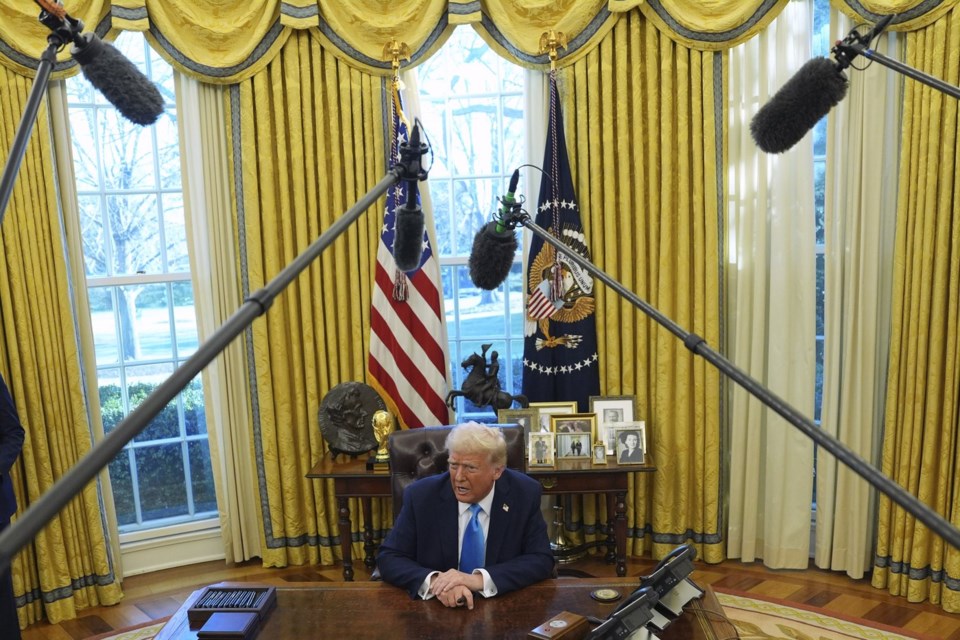Canadian researchers who rely on funding from an American agency that saw some of its operations frozen last month due to an executive order by U.S. President Donald Trump are breathing a sigh of relief after the pause was lifted Tuesday — but they're not celebrating just yet.
The move comes almost two weeks after the National Institutes of Health (NIH) was ordered to pause reviewing proposals for funding research projects, which scientists and doctors say is critical to advance health research. Last year, over $40 million of NIH funding went towards Canadian projects.
York University professor Godfred Boateng, who sits on the review committee, was invited to assess applications for the NIH's $48-billion budget this year.
He explains that the directive to pause all meetings and review trainings came from a scientific review officer at the NIH and referenced Trump's executive order to cancel the health agency's January schedule.
"My only concern was the fact that researchers who may have worked hard and submitted grant applications may not have the opportunity for their grant applications to be reviewed," Boateng said.
U.S. President Donald Trump made a series of executive orders that week, which also included ending federal spending on diversity, equity, and inclusion (DEI) programs and mandating policy that the U.S. would only recognize "two sexes, male and female."
On Tuesday, Boateng said the health agency resumed scheduling for meetings in February without acknowledging the prior pause that had taken place. An NIH spokesperson said Tuesday that the health department is working to align with Trump’s agenda.
After finding out the news that reviews were back on, Canadian doctors and researchers say they are still eager to see what research projects will get funded — particularly when it comes to DEI research, and studies on global health.
Dawn Bowdish, an immunologist, said she's worried research that even mentions sex will be entirely dropped because of the executive order that prompted the pause in the first place. She fears this could happen behind the scenes after reviewers score applications.
"Scientists I think are concerned that decisions may be made at that administrative level to either cut excellent work or alternatively to fund work that doesn't hit the bar of excellence," Bowdish, professor of medicine at McMaster University, said.
She's concerned about the future of her own research on how the aging immune system affects arthritis because it distinguishes female and male responses in mice. The project is currently in the third year of a four-year NIH grant for $30,000 a year.
"Based on the instructions that the Trump government is giving now, even acknowledging that there are differences in the biology of the immune system which, by the way, there are.... Suddenly, all of a sudden that could be contentious," she said.
In this political climate, she said it's unlikely the grant will get extended if they need more time.
"What will happen if we're not allowed to report stuff like that anymore?" she said. "I really never thought that I'd have to worry about this."
Canadian researchers rely heavily on NIH funding, which is much larger than that provided by Canadian Institutes of Health Research. Last year, it was just under $1.3 million according to its website. The government proposed investing more in CIHR in its fall budget, but it's unclear if that'll come to fruition since parliament is prorogued.
American-Canadian immunologist Juan Carlos Zúñiga-Pflücker said the recent issues with U.S. funding illuminates just how much the Canadian government is underfunding health research.
"I feel that we are making sure that Canadians are headed to a real disaster in terms of funding levels and our ability to develop new therapies and come up with the necessary discoveries," said Zúñiga-Pflücker chair of the department of immunology at the University of Toronto.
Veena Sriram, Canada research chair in global health policy at the University of British Columbia, said the fact that there was a pause in the review of grant funding signals a resistance to independent research. "Particularly, science that does not appear to kind of suit an ideology that might be in favour for particular governments at the moment."
She applied for an NIH grant to study bicycle policies and governance in India, and said there is reason to believe the federal agency might pull funding for global health projects.
Trump's executive orders have stated that he wants taxpayer dollars to be focused on advancing the health of Americans, which began with a withdrawal from the World Health Organization shortly after his inauguration.
Sriram and others see this as an alarmingly narrow approach to research that won't get to the heart of health issues.
“The challenge now if you take a nationalistic, domestic focused approach to research is that you miss a major part of the picture by focusing very narrowly in one particular context. You're not seeing how that issue that you're researching is impacted by these global forces,” Sriram said, referencing the pandemic as a stark example.
"I think we need to be very concerned and we have to also ensure that we are staying vigilant here in Canada and in other contexts so that we can protect independent research," Sriram said.
This report by The Canadian Press was first published Feb. 5, 2025.
Canadian Press health coverage receives support through a partnership with the Canadian Medical Association. CP is solely responsible for this content.
Hannah Alberga, The Canadian Press




